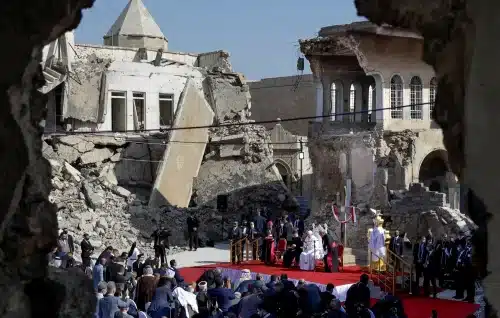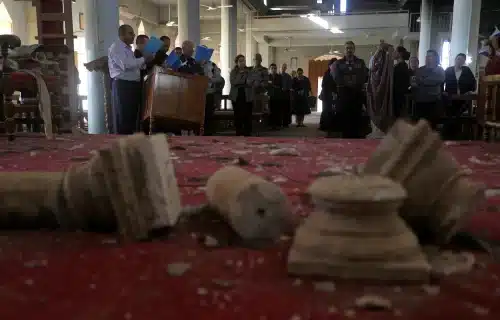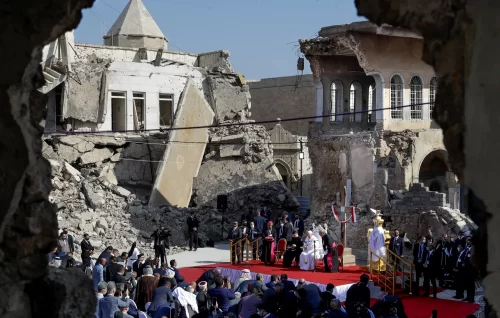
Whatever the pretense for the U.S. invasion of Iraq two decades ago, the reality never lived up to the hype. And the costs were shockingly high: hundreds of thousands of civilian deaths, thousands of U.S. soldiers killed, trillions of dollars spent, and increased geopolitical instability.
Also, the demise of Iraq’s Christian population.
Rt. Rev. Bashar Warda, the Chaldean Catholic Archbishop of Erbil, warned in 2019 that “Christianity in Iraq … one of the oldest Churches, if not the oldest Church in the world, is perilously close to extinction.” His alarm is not misplaced. The number of Iraqi Christians has fallen precipitously over the last two decades, declining from an estimated 1.5 million adherents to less than 250,000.
Their waning numbers have weakened their social power. While the rights of Christians received formal protections in the Kurdish-dominated north, perceptions exist that the country’s new government is stepping up enforcement of morality laws that disadvantage religious minorities, including Christians.
Following the U.S. invasion in 2003, violence forced many Iraqi Christians to flee their homes for safer parts of the country or the refuge of foreign soil. Kidnappers targeted them because of their relative economic wealth and Islamists persecuted them because of their perceived association with the invading armies and Western culture.
Then came ISIS. Following the first U.S. withdrawal from Iraq in 2011, the militant group violently challenged the Iraqi government and took over significant portions of the country. Christians found themselves targeted for persecution.
While Iraqi, Syrian, and U.S. forces eventually seized back territory from ISIS and decimated the group’s operations, the violence permanently altered the Iraqi political and religious landscape. After 20 years of war, Iraqi Christians enjoy less vibrancy and acceptance than before.
Pope Francis, surrounded by shells of destroyed churches, attends a prayer for the victims of war at Hosh al-Bieaa Church Square, in Mosul, Iraq, once the de-facto capital of ISIS, on March 7, 2021. (Andrew Medichini/Associated Press)
“Religious minorities test a country’s tolerance for pluralism; a healthy liberal democracy protects vulnerable groups and allows them to participate freely in society. Whether Christians can survive, and thrive, in Muslim-majority countries is a crucial indicator of whether democracy, too, is viable in those places,” wrote The Atlantic’s Emma Green. “In Iraq, the outlook is grim.”
This tragedy that unfolded over the past two decades didn’t occur in a vacuum. It’s the direct result of the 2003 U.S. invasion that many U.S. followers of Jesus supported. So in this edition of A Public Witness, we revisit how too many American Christians decided to, as William Shakespeare put it, “Cry ‘Havoc!’, and let slip the dogs of war.” Then this issue considers what lessons the American Church can learn two decades later in the hopes of not repeating a sin of such consequence.
One of us (Brian) learned about the start of the U.S. invasion of Iraq while sitting in church. As the bombs began to fall in Iraq late on March 19 and early on March 20, news made its way back to the United States. The pastor of the church where Brian was serving as a pastoral intern heard the news shortly before the Wednesday night Bible study, whispered it to Brian (who had been leading efforts to push an anti-war perspective at his Baptist college), and then started the church time with a lament.
But not all churches reacted that way. In fact, many Christians supported the war that was authorized with bipartisan congressional support. A month before the invasion started, Gallup found that 59% of Americans supported military action, but 64% of evangelicals supported it and those who attended church more frequently supported it in greater numbers than those with less regular attendance.
Two decades later, it’s worth remembering some of the ways U.S. Christians reacted ahead of the invasion.
The Good. On Ash Wednesday in 2003 (March 5), a Vatican representative visited the White House to hand deliver a letter from Pope John Paul II to President George W. Bush. In the letter, the pope asked the president to listen to his envoy, Cardinal Pio Laghi. But the conversation soon fell apart as Bush argued about why the war was necessary and refused to listen. By that time, John Paul II had already made his position clear in public communication as the most outspoken world leader standing against Bush’s war plans.
“No to war! War is not always inevitable. It is always a defeat for humanity,” the pope declared on Jan. 13, 2003, as he criticized “the threat of a war which could strike the people of Iraq, the land of the prophets, a people already sorely tried by more than 12 years of embargo.”
Bishop Adam J. Richardson, president of the Council of Bishops of the African Methodist Episcopal Church, said that while he is “not against the military nor military personnel,” he believed “the leadership is wrong.” He added, “The right-wing faction of Christianity is doing Christ a disservice by attempting to back their jaundiced views with scripture, trivializing the Bible in public view and making a mockery of the best traditions of biblical scholarship.”
Presiding Bishop Frank Griswold of the Episcopal Church also sharply criticized the march to war, including the religious language used by Bush to justify an invasion. He explained, “Quite apart from the bombs we drop, words are weapons and we have used our language so unwisely, so intemperately, so thoughtlessly.”
Jim Wallis of Sojourners urged alternative ways of addressing the abuses of Saddam Hussein than through war. He prophetically warned, “How we respond to this threat will shape the kind of people we’re going to be. And that’s the moral question: How do you not become something terrible in your response to something terrible?” And some, like Shane Claiborne and Jonathan Wilson-Hartgrove, even traveled to Iraq to bear witness as the bombs fell.
Particularly worth noting is the opposition to the war by many leaders of the United Methodist Church, the denomination that Bush calls home. For instance, Jim Winkler, general secretary of the United Methodist Board of Church and Society, urged Christians to “oppose this reckless measure.” He added that it was “inconceivable that Jesus Christ … would support this proposed attack.” Bush instead decided to listen to a different group of Christians.

A protester paints a peace dove on cloth in front of the U.S. airbase in Frankfurt, Germany, on March 15, 2003. (Frank May/Associated Press)
The Bad. Although the pope and some Protestant leaders condemned the impending war, people in the pews didn’t always follow. And some Christian leaders who did speak out found themselves criticized by their coreligionists. Some denominational leaders found safer ground by issuing generic statements about praying for peace. Most clergy took no stand on the war.
But while the silent crowd ceded the moral ground to politicians and military officials, some conservative Christian leaders trumpeted the need for violence. Usually focused on claiming it would be a “just war,” such rhetoric nonetheless generally backed whatever the president asserted.
“Our president has been entrusted with the sword. He may have to use it,” said Rev. Gerald Kieschnick, president of the Lutheran Church–Missouri Synod. “We pray for God’s wisdom to guide him in the execution of his duty, that peace may prevail for us and for all people.”
Kieshnick had previously bestowed on Bush the divine authority to wage war. After 9/11, he told Bush, “You are not just a civil servant; you are a servant of God called for such a time like this.” And Kieshnick wasn’t the only conservative Christian leader to push this theology.
“This war is ‘just’ because its cause is liberation not occupation, protection not aggression, peace not appeasement,” declared Southern Baptist Convention President Jack Graham, pastor of Prestonwood Baptist Church in Texas, in a statement that mixed in scriptures, hymn lyrics, and a reference to 9/11 (even though Iraq wasn’t involved). “Now is the time for all Americans to band together as brothers and sisters in support of our nation, our Commander and Chief [sic], George W. Bush, and our military forces. I encourage our pastors and churches to designate days of prayer and fasting. May our families join together in personal and private intercession. Let us ask God for a mighty outpouring of his Spirit across America and around the world. As our Marines say, Semper Fidelis — ‘Ever Faithful,’ Southern Baptists.”
The Ugly. In addition to offering support for the military actions, some U.S. Christians celebrated the start of hostilities because they believed it would create great evangelistic opportunities. Moving from calling it merely a “just war,” such an approach viewed it as a righteous mission. This crusader mindset not only proved inaccurate, but also justified death and suffering as an evangelism tactic.
For instance, John Brady, coordinator of the Southern Baptist Convention’s International Mission Board work in the Middle East and northern Africa, told Baptist Press in April 2003 that the outreach potential in Iraq was “a pivotal moment in history, a unique opportunity to share with a people we have prayed for a long time.”
“American soldiers are dying to assure the political freedom of Iraq. As a Christian, I must ask myself, ‘What am I willing to do for Iraq’s spiritual freedom?’” Brady added. “Even after the war is over, the Iraqi people will not know real peace unless they have God’s peace within their hearts.”
Thus, the IMB created an initiative they christened “Operation Iraqi Spiritual Freedom.” They urged Christians to join the evangelistic outreach they planned as they followed the U.S. military into the nation.
“With Iraq, God has opened a door into the very heart of the Muslim world for us!” argued David Clippard, executive director of the Missouri Baptist Convention. “We must step through this historic opportunity. This is an unprecedented ministry opportunity of epic proportions.”
“Historically, wherever GIs have gone, the gospel has gone with them,” he later added as he claimed this was “the first time in 14 centuries Christianity has the door opened to it” in Iraq despite the Christian communities there that predated the United States by 16 centuries.
The prophesized revival never occurred. The IMB’s efforts at food distribution ended after just weeks in 2003 amid concerns about violence. The deaths of four IMB aid workers in a drive-by shooting in March 2004 canceled upcoming trips by others and the much-touted evangelistic opportunities quietly disappeared from their websites and news reports before the second anniversary of the invasion. The war brought not a great awakening but a great decimation of the historic Christian community.
Get cutting-edge reporting and analysis like this in your inbox every week by subscribing today!
“Those who cannot remember the past are condemned to repeat it,” philosopher George Santayana memorably cautioned. When it comes to justifying the unmitigated moral disaster that was the U.S. war in Iraq, American Christians cannot rewrite history. Still, there is immense value in revisiting this tragic episode in the hopes of avoiding future moral failures of the same magnitude.
The most obvious lesson is the allure of nationalism and the tunnel vision it creates. Uncritical allegiance to the cause of a nation and the vision of its leaders is a recipe for disaster. Nationalism’s jealous demand of loyalty also ignores our shared responsibility for public life. In a democracy we are all responsible for what our government does. We elect the leaders who make policy. We pay the taxes that fund wars. In a more than theoretical way, “we the people” are complicit in any mistakes our country makes.
Recognizing that, we need to be vigilant in holding our government accountable for the actions it takes in our name. Faithful citizenship requires more than the cheerleading expected by a fervent nationalism.
“Christians in America supported the war because they were Americans,” theologian and ethicist Stanley Hauerwas, author of The Peaceable Kingdom, told us. “The identity remains today. I fear that until there is an alternative to that presumption, Christians will continue to support war as a necessary policy.”
For Christians, the importance of separating discipleship from citizenship should be obvious. Given that Jesus died by crucifixion at the hands of the Roman Empire, an inherent skepticism toward state power and military violence should be foundational to our faith. Yet, there remain moments when national identity trumps religious faith.
“Right-wing Christians then were generally in the pro-war camp,” Catholic theologian William Cavanaugh, author of Migrations of the Holy: God, State, and the Political Meaning of the Church, told us. “Twenty years later, such Christians lean toward Trump’s America First platform and a reluctance to get involved in wars from which America will not directly benefit. What right-wing Christians in the two eras have in common is a failure to apply the gospel directly to questions of war and peace, and a failure to see Jesus as anything but a prop for American nationalism.”
At such times, the appropriate response for Christians is to express remorse for our failures. At a 2007 event in Washington, D.C., organized by a Christian group promoting such national soul-searching over our military adventurism in Iraq, Rev. Raphael Warnock (who is now a senator from Georgia) said, “The danger confronting America is not that we may lose the war. The real danger is that America may well lose its soul.”
Polling data is an imperfect measure for evaluating the state of our national soul, but it reveals something about what the country believes. In March of 2003, just after the invasion began, a Gallup survey found that only 23% of respondents believed the war was a mistake. Asked the same question in 2019, that number rose to half of all Americans.
On the one hand, the increased disillusion indicates how many minds have changed. Yet, others still remain unwilling to consider or unconvinced of the folly. And even where opposition now exists but once didn’t, little in the way of repentance has been offered. Views evolved without any public regret over past errors or meaningful efforts to make amends.

Iraq Christians pray inside St. Addai Church in Keramlis, Iraq, on Nov. 13, 2016, after the building was badly damaged by ISIS fighters who occupied the village. (Hussein Malla/Associated Press)
“It seems very, very difficult for Americans — Christians or otherwise — to repent for anything,” Christian ethicist David Gushee, author of the forthcoming Defending Democracy from Its Christian Enemies (and a Word&Way board member), told us. “So we don’t appear to be an especially reflective nation or Christian community. So much so that when asked to reflect on the past, we ban the discussion of America’s racial history. So 20 years ago, a war of choice was undertaken by the United States over the objections of the U.N. and without the support of most of our allies. But it was supported by Christian conservatives primarily because they trusted a Republican president. And that has never been repented of, as far as I know.”
Thus, Gushee suggested that denominations that supported the war should publicly repent. And he said it could be “brave pastoral leadership” for a pastor to stand in the pulpit to admit they previously stood there to support the war but now have learned from that error.
Until that kind of national reckoning is undertaken and we work to repair the damage, the war in Iraq won’t truly be over.
As a public witness,
Brian Kaylor & Beau Underwood

